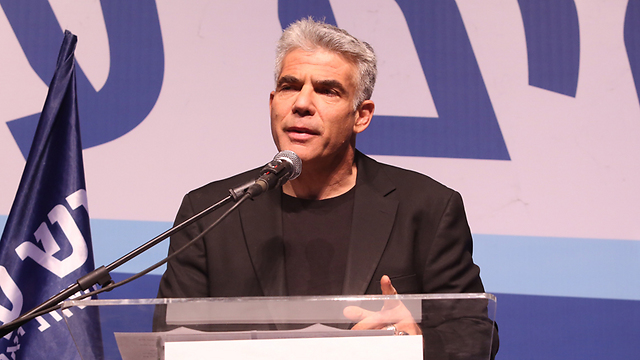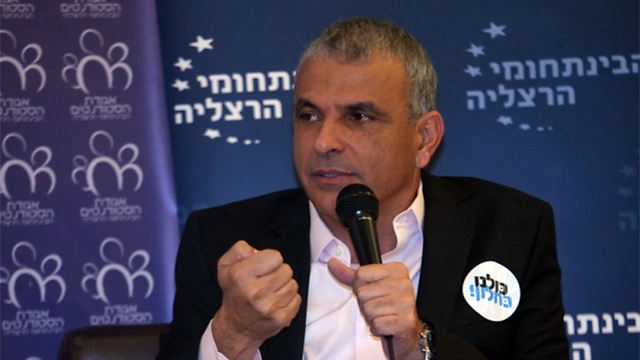
With the Israeli election over, and the emerging coalition becoming clear, the clock has immediately begun to run on the time periods required by law to form a government and approve the state budget. In the meantime, the most pressing problem is how to close the gap between expenditure and revenue, which is edging toward NIS 6 billion.
Party representatives have begun a series of meetings with President Reuven Rivlin to make their recommendations on who will be tasked with the formation of the government, and if all goes as planned – that person will be Benjamin Netanyahu.
From that point, Netanyahu has 28 days to form a new government, with an option of extending that period by two weeks. And even during the coalition negotiations, the budget – both this one and the next – will play a central role.
Netanyahu will likely fulfill his campaign promise of nominating Kulanu chief Moshe Kahlon as finance minister, meaning the monumental task will fall on the former Likud minister, who is best known for his reform of the telecommunications market.
According to the Governance Law, once the government is sworn in, it has 55 days to approve the budget, and the Knesset must approve it within 45 days, but exceptions are also possible. In 2013, the government was only sworn in March, and the Knesset approved a temporary measure giving the government 130 days to approve the budget. In the end, the budget was only approved in late July, but then – unlike now – there was no budget ready and waiting for approval.
Related articles:
- Weak shekel, election-delayed budget could help Israeli economy
- Israel 2014 budget deficit meets target despite Gaza war cost
- Israel pays out tiny portion of food security budget
The new budget has already been approved by the government, and the new government must choose one of three scenarios – either move ahead with the existing budget and approve it, create a two-year budget for 2015 and 2016 or draft an entirely new budget.
Scenario 1: Sticking with what you have
In the first scenario, the new finance minister decides to approve the current 2015 budget, with minor modifications, and try to advance his own agenda with the 2016 budget. The 2015 budget does not include any major reforms, so that its advancement by the new finance minister, whoever that may be, will not demand any far-reaching compromises. One of the most significant sections of the 2015 budget, 0% VAT for new apartments, has been removed, and as a result state revenues are expected to grow by NIS 2 billion.
In addition, the Economics Arrangement bill (a supplement to the state budget) did not pass several legislative amendments that were supposed to close various tax loopholes and raise taxes on foreign workers, meaning state revenues will fall short of the original forecast by about one billion shekels, bringing the revenue forecast for this year down to NIS 260.8 billion from 261.8 billion.
If the 2015 budget is approved quickly, there is a chance that government expenditure will be harmed as reforms to the Jewish National Fund may be canceled. These reforms state that the JNF's billion-shekel revenue from the sale of land will be managed by the state, or that the JNF will start to be taxed on this income for the first time. This cancelation is set to reduce government spending by one billion shekels.
Even if there is agreement on the 2015 budget, it is still too early to know whether this agreement will apply in years to come, and whether the government will be able to advance the legislation, given opposition from inside the anticipated coalition.
Given that at least half of 2015 will pass with an extended budget from 2014, the slight changes in the new budget could be swallowed with ease. The previous government and the Knesset Finance Committee had approved a rise in the deficit target for 2015 from 2.5% to 3.4%, but this was ultimately not confirmed by the Knesset and is therefore invalid.
As such, the new finance minister will have to determine whether to advance the higher deficit set by predecessor Yair Lapid, or stick with the current deficit target, thereby forcing him to keep to the current spending allowance. In the event that the 2016 budget is separately approved, all the promises by the government will have to be met.
According to the Finance Ministry, the gap between expenditure and revenue in 2016 is expected to reach NIS 5.6 billion; in order to close this gap the government must cut NIS 3.6 billion in costs, while increasing its revenue by NIS 2 billion.
But given that none of the members of the potential new coalition (as well as most of the opposition parties) support a raise in taxes – except for United Torah Judaism and Shas, who speak only of taxing the wealthy – the gap may well grow.
The gap of NIS 5.6 billion includes an offset for a NIS 2 billion loss in revenue, following the 0% VAT on new apartments. This was ultimately canceled, but the offset stays, in anticipation of a similar loss due to VAT exemptions on price-regulated foods.
Prime Minister Netanyahu announced a plan for 0% VAT on food in the week in which he also fired then-finance minister Yair Lapid and then-justice minister Tzipi Livni, but has barely mentioned it since. In the meantime, all the parties have jumped on the bandwagon, eager to paint themselves as socially responsible.
The gap means that Israel may have to add one billion shekels to its spending, which was supposed to be balanced by the income from the JNF. To deal with this growing gap, the government could raise the income tax, which is impossible in the 2015 budget as direct taxation can only be increased at the beginning of year (as these taxes are calculated at an annual rate).
The 2013-2014 budget included the provision that income tax would rise at the beginning of 2014, but then-finance minister Lapid decided at the last minute to cancel this increase. If the hike had gone into effect, it would have raised NIS 3.3 billion in revenue – a massive part of the gap between government revenue and expenditure.
Another option is to raise VAT, but the chances of such a move are not great, given that VAT already stands at a relatively high 18%. In addition, an increase in VAT would be felt more among the weaker sectors of society, and it is extremely unlikely that either Moshe Kahlon or the religious parties would support such a move.
Another option for the government is to increase its revenues by raising the capital gains tax, dividends tax or corporation tax, but given the fierce international competition that exists today, the chances are again slim.
The debate over the Law for Encouragement of Capital Investments today focuses on whether to require companies to increase their activity in return for benefits. Some members of the committee reviewing the law argue that Israel should be expected to increase the amount of benefits to keep those companies in the country.
The growth of the gap between government expenditure and the spending limit, which already stands at NIS 3.6 billion, is harder to predict.
During an election season, politicians all too easily throw out expensive promises, but do not say where they will make cuts to fund those promises. One can already predict, therefore, that the gap between expenditure and the expenditure ceiling could more than double.
Scenario 2: A two-year budget
If the government decides to approve the budget for 2015 only, the tight schedule will force some Finance Ministry officials to start immediate work on the 2016 budget. If a decision is made, however, to approve a two-year budget for 2015 and 2016, the government will be forced to make more difficult decisions.
While it is not possible to raise income tax at this point, a decision to do so can be taken in 2016. But it was only last week that Israel had an election in which all the parties promised not to raise taxes, and no party will want to take such a step so soon after it made such a pledge.
If the government does not act now to solve the gaps that the Finance Ministry itself presented in the budget approved by the previous government (which will probably be extended), Israel will begin 2017 with a far greater gap of NIS 11.9 billion (which would force a spending cut of NIS 4.9 billion and an increase in revenue, ie taxes, of NIS 7 billion).
And this calculation is even made under the assumption that one can cut expenses totaling one billion shekels, using the revenues from the JNF; without relying on the JNF, the gap would be NIS 12.9 billion.
If the necessary adjustments are not made now, the new finance minister will not be able to blame his predecessor for the massive cuts and tax increases that he will be forced to implement, as he will be the one who authorized the two budgets before him. Assuming he survives that long, of course.
Scenario 3: A brand new budget
The third option available to the government vis-a-vis the budget is to shuffle all the cards and start the 2015 and 2016 budgets from scratch.
A finance minister who wants to prove that he has come to act and change, and who wants to remove his predecessor's fingerprints from the budget, may well want to stick to the 2015 budget, and avoid a biannual budget and all its pitfalls.
Such a decision would require extremely intensive work from all government departments, in particular the budget department. The chances of this option being exercised are very low, since the government has about 55 days to approve the budget before the countdown begins on the 45 days allocated to the Knesset for its approval.
The central issue is the deficit. To the relief of the politicians, most of the public does not deal with the question of the deficit target and/or the ratio of debt to GDP. The problem is that the public may well pay the price for such decisions in a few years' time, when there is a raise in interest rates for bonds sold by the State of Israel and an increase in taxes.
The outline of deficit approved by the Finance Committee in November also states that the deficit target will be 1% by 2020, a sharp decline from today. For this to actually happen, Israel will of course need to increase revenues, raise taxes and keep the existing expenditure framework intact.
According to statements by the parties expected to join the coalition, there is small chance of these things happening gradually, at least for now. Lapid allowed himself to increase the deficit target in 2015, which also made it easier for the new government and the new finance minister. But if the finance minister does not change the deficit target in the coming years, he will have to face the harsh reality inherited from Lapid.

















